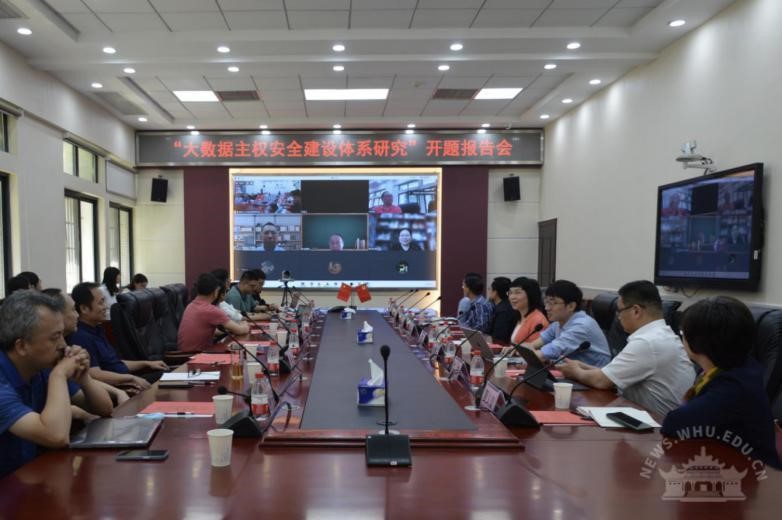On the afternoon of May 6, the Opening Meeting of Research on the Construction of Big Data Sovereign Security System, the 2021 Major Project of the National Social Science Fund of China, was held via virtual and reality combination meeting. Congjing Ran, Professor at the SIM,Wuhan University, Deputy Director of the Center for Studies of Information Resources, Wuhan University, Key Research Base of Humanities and Social Sciences of Ministry of Education, is the chief expert of this project.

The experts participated in the opening meeting were as followings:
Dongmei Xiao, head of the expert review group, Professor and Dean of the School of Intellectual Property, Xiangtan University,
Xiaoqing Feng, Professor and Director of the Intangible Assets Management Research Center, China University of Political Science and Law,
Chuanfu Chen, Senior Professor of Humanities and Social Sciences at Wuhan University,
Wei Lu, Professor and Dean of the SIM, Wuhan University,
Jiang Wu, Professor and Associate Dean of the SIM,Wuhan University,
Xiaoguang Wang, Professor and Associate Dean of the SIM,Wuhan University,
Lihong Zhou, Professor and Associate Dean of the SIM,Wuhan University,
Gang Li, Professor at the SIM,Wuhan University, Director of the Center for Studies of Information Resources, Wuhan University, Key Research Base of Humanities and Social Sciences of Ministry of Education,
Yikun Xia, Professor at the SIM,Wuhan University, Deputy Director of the Center for Studies of Information Resources, Wuhan University, Key Research Base of Humanities and Social Sciences of Ministry of Education,
Ruhua Huang, Professor at the SIM, Deputy Curators of Wuhan University Library,
Zhi Rong, Professor at the School of Political Science and Public Administration, Wuhan University
Shaohui Wang, Associate Professor at the School of Political Science and Public Administration, Wuhan University,
Hui Zhang, Professor and Deputy Director of the Institute of International Law,Wuhan University,
Chenliang Li, Associate Professor at the School of Cyber Science and Engineering, Wuhan University.
Congjing Ran made a keynote report from four aspects: research background and significance, existing research foundation, research assumption of this project and the proposed results. He pointed out that the research of this project would follow the basic research paradigm of "propose questions, analyze questions and solve problems". The general idea is to first put forward the urgent problem of sovereign security of big data, then analyze the problem itself, summarize the international sovereign security model of big data, and finally give the solution to the problem.
The leaders of the five sub-projects respectively report on the key problems to be solved, research ideas and the results to be formed. They said that they would carry out the research of big data sovereign security construction system according to the logical thinking of "demand investigation, theoretical system construction and security system design".
The reviewing experts believe that the project has important theoretical value and practical significance, and the logical relationship among sub-projects is clear, the research objectives and methods are clear, and the technical methodology is feasible. Experts suggest that it is necessary to strengthen multi-agent and multi-field cooperation, give full play to the collective effect, build a think tank with national influence in data governance and data security, put forward more targeted consultation reports for government, and make contributions to promoting the actual needs of the country.

Dongmei Xiao, head of the expert review group, made a summary of the opening meeting. She suggested that the project team should broaden their horizons and focus on major core issues, and strengthen international exchanges and cooperation; Strengthen theoretical construction in defining core concepts such as data sovereignty and data security; Pay attention to the landing of results, truly tap the value of "data sovereignty", and produce application results with visibility.